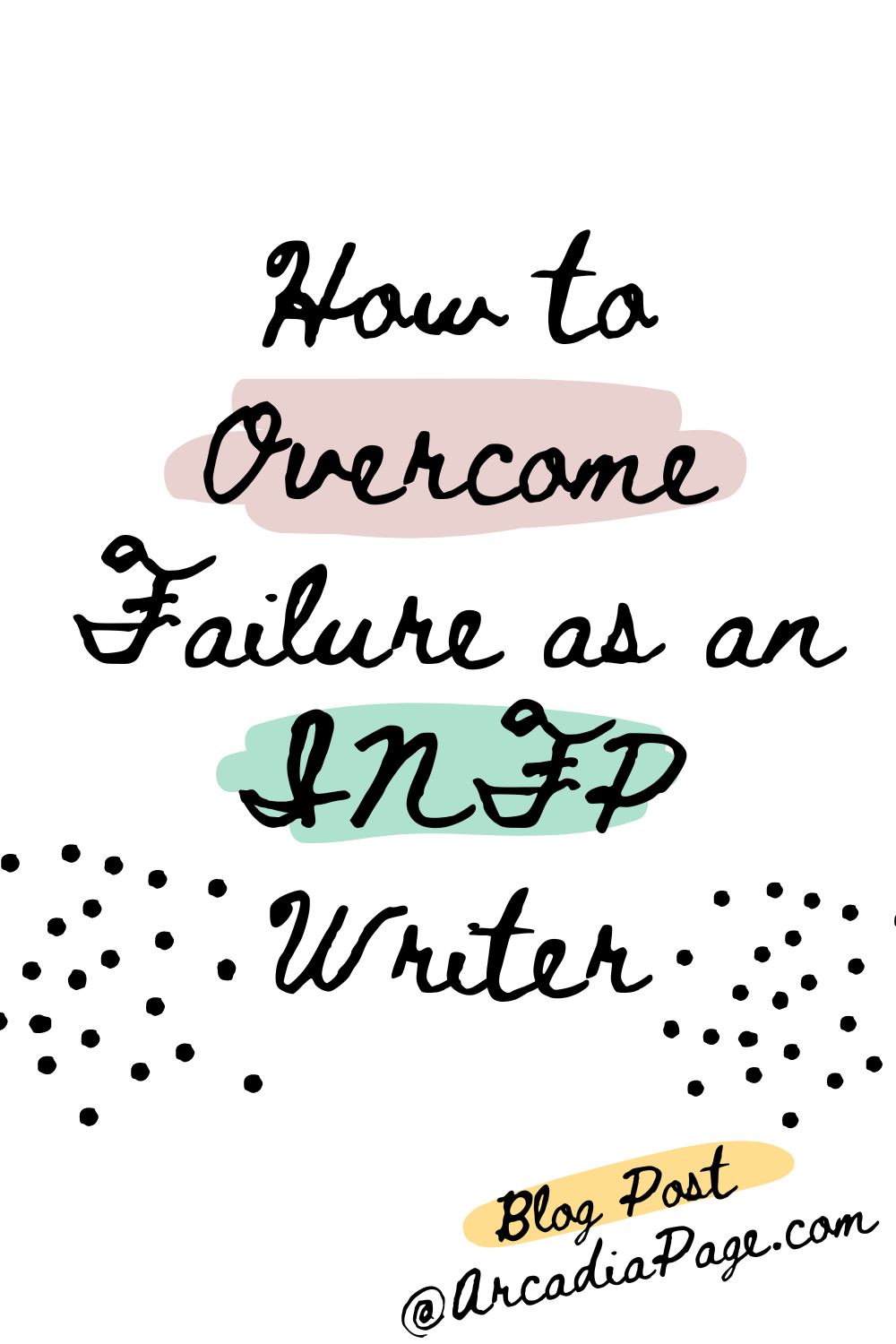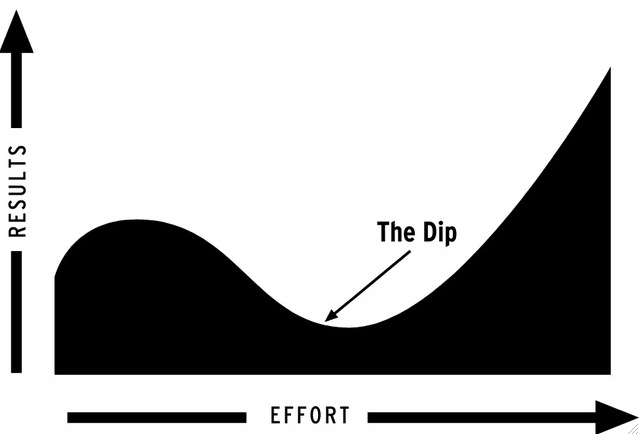I appreciate those who are always pointing out the benefits of failure. Failing truly is a chance to learn and grow.
Still all this optimistic thinking around failure doesn’t remove the fact that failing hurts. It makes you question if you’re doing the right thing. It makes you wonder if you’re a victim of your idealism or if you simply don’t have what it takes to do what you want.
When I face failure, I get mired in rumination. I think, “What did I do wrong? What did I overlook? Can this be fixed?”
The INFP part of me whispers, “Maybe what I wrote wasn’t meaningful. Maybe no one cares. Maybe my writing doesn’t matter. Maybe I don’t matter.”
Then my psycho Enneagram 3 side and inferior extraverted thinking kick in and are like, “Failure? I never fail, and if I do fail, so help me I will show everyone that my failure was not a failure. It’s falling with style, thank you very much.”
(The whole idea of “Failing Up” is such an Enneagram 3 thing. So much of my life has revolved around attempting to transform failures into successes because it’s so hard for me to accept the loss. If you’re an Enneagram 3 who has stumbled on this post, please learn how to allow yourself to actually fail once in awhile.)
Neither one of these views are completely honest.

Talk to People You Trust About Your Failures
When facing failure or a string of failures, I’ve found it’s best to get out of my head. Talking with other creative friends and family members is helpful because they tend to give better advice than the basic, “It’s not as bad as you think. You can do better next time.”
Very creative people fail a lot, so any advice they give is from hard won experience. Don’t be shy about expressing your weaknesses. In fact, when I talk to others about my failures, I find that those relationships get stronger due to the sharing of adversity.
When my Kickstarter project failed, I expressed my feelings to my husband, and he reminded me of the concept of “Fail Fast, Fail Often.”
Failing at a project fast can be good because you can see what’s wrong with it before you invest more time and energy. And failing often can help you see failure not as this huge devastating event, but as simply part of the learning process.
Read About Failure
After talking about my failures, I like reading books and articles about failure. Part of it is because misery loves company. And another part of it is that I like knowing how others approach failure.
Reading books about failure makes me feel understood. They remind me that things going wrong is not the end of the world.
After doing some online research on the “Fail Fast, Fail Often” concept, my mind went back to a book entitled The Dip by Seth Godin. I’ve only read parts of it here and there, but I decided to go ahead and give the whole book a read.
This book came out in 2007, so it reflects a time in US culture when the work ethic of Silicon Valley CEOs was revered and workaholic-ism was a badge of honor. But with the burnout-glorifying language removed, this book has some beautiful ideas about failure, which I’ll be sharing here.
I’ve found this book especially helpful for dealing with a string of failures. When you feel like you can’t do anything right is actually the most important stage of becoming proficient in your craft.
Respect “The Dip”
Have you ever started a new writing project, and at first everything was great? The words were flowing and the chapters went flying by. It’s just awesome. But then out of nowhere, the writing gets hard. You struggle to get one paragraph on the page. At this point you feel like giving up or abandoning this project to start a new one.
This writer’s block is also “The Dip”.
The Dip is where reaching a goal or learning a new skill gets tough, but that tough part MUST be crossed to gain mastery or achieve completion. It’s called The Dip because we get low results compared to the amount of effort we put in. And unfortunately, it often gets worse before it gets better.

It’s like how when learning a new language, many people can get into learning the vocabulary, but it’s mastering sentence structure, grammar and pronunciation that separates those who are fluent from everyone else. Mastering language mechanics is the hardest but most essential part for proficiency, and that’s when most people quit. It takes a lot of effort, and it can take awhile to see results.
Failure often happens in the face of The Dip. Lack of knowledge, skills, and experience can cause you to misjudge the quality of your projects or their intended audience. It can also cause you to feel like you don’t have any solutions that can help you to achieve what you want.
This experience can be painful and embarrassing, but it holds an important lesson.
Take Failure as an Opportunity to Improve Your Skills
The Dip is unavoidable. Other than quitting and dropping what you’re working on to start something new, the only way through it is to educate yourself and improve your skills with persistent effort.
You must keep showing up to your craft even if you feel like a total loser. That is the only way to get better and eventually make an impact.
Once you get through The Dip, that’s when you’ve gained the knowledge needed to finish the novel, master the language, or run a successful business.
Personally, I experience The Dip with most of my writing projects, from blog posts to books. I also experience it when it comes to doing business online as a whole. This is why writing is so challenging. Even experienced writers can face The Dip because every project is different.
It’s twice as challenging when self-publishing because not only do you have to develop writing skills but you also have to grow business skills in tandem. Hitting The Dip in both areas is what causes many self-published authors to give up. You must sharpen both skills to survive.
Those who say that self-published authors are looking for an easy way out know nothing about self-publishing. True, anyone can publish their book online, but it takes expertise to make a sustainable business out of it.
Rethink the Benefits of Failing
In hindsight, I’m a bit relieved that my Kickstarter project failed. I’m still healing from burnout and learning to deal with chronic pain. That kind of pressure is not what I need in my life right now. Maybe in the future I’ll be in a place where I can handle that.
This failure also reminded me that life’s unpredictability can destroy the best made plans, and that is nothing to beat myself up over.
A failure can reveal when you’re pursuing something that’s not taking you where you want to go. You may even decide not to persevere through learning from a failure because you realize you don’t want what succeeding could bring you.
Failure can clarify what is not for you, highlighting dead-end goals and dreams.
Resist the Urge to Mindlessly Abandon
If you find yourself starting a bunch of writing projects and never finishing, not knowing how to work through The Dip may be part of the problem.
Take it as a sign to dig more deeply into learning about the craft of writing. Work diligently on improving your skills until you can finish something. Once you figure out how to finish, that knowledge will serve your writing practice forever, and you will improve a lot.
If you’re trying to sell your work online and find yourself struggling, educate yourself and keep making adjustments until you find what works. Keep making the products you are good at with an eye on how to improve each time.
This will be hard and challenging. The learning curve will be steep, and it may take a long time to figure things out. Be patient and kind with yourself, and keep in front of you where you are trying to go.
Never Forget Your Big Idea
What was the one big idea you wanted to get across with the project that failed?
With my Gentle Productivity Kickstarter book, I wanted to share this idea:
Productivity does not have to be toxic.
Although the future of this project is in question, this big idea still lives on in my previous books and in this blog.
When looking at your failed projects, take note of the big idea that runs through them. Just because you had to abandon your project, you do not have to abandon your big idea.
This is the fuel that will keep you going. Do all you can to hold on to that.
(P.S. If you are looking to create an easy, compassionate writing practice that resonates with you, you may also enjoy Love Your Writing Life - A Self-coaching Course for INFP Writers.